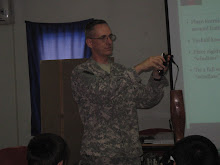The Dari and Arabic word for interpreter is turjuman. Interpreters are very important to all that we do here. I cannot mentor or work with my Afghan counterpart if we cannot understand each other. Even though my Afghan counterpart and I can communicate in some small way with my limited Dari and his limited English, it is always best to have an interpreter present. I once had a conversation with my counterpart without an interpreter present as I toured him around our camp. He was shocked when I talked about our "Fire House". He thought that we were shooting weapons inside of our Fire Department building, oops.
We had our Afghan Police Medical Director and his Quartermaster come to visit us today. As always we made some progress on several issues and learned more about each other and the system that we each work with. We were lucky enough to have two interpreters present today. The second interpreter did not really contribute to the conversation at all, but our interpreter did admit afterwards that he felt like he did a much better job today since he knew another interpreter was listening. A little competition can be a good thing.
There are several categories of Interpreters employed by the Department of Defense. Category I are local nationals like our team interpreter. They are usually hired through an Afghan contractor. They get paid monthly for their services and some extra money for going out on missions with us off the Camp. I dare say this extra money does not adequately compensate them for the potential danger they face. If you read the news headlines closely you will find the names of many interpreters among the wounded or killed in battle reports. Since they are targets for insurgents many interpreters work in areas that are not their home provinces. They also use names which are not their real names, so that they and their families cannot be tracked down easily. Many interpreters live in areas adjacent to Camps or FOBs, although a few continue to live locally with their families and commute. While there are many interpreters who perform their services for noble reasons, the main reason is the money. A US employed interpreter can make much more than a doctor, teacher, and most officers in the Afghan Security Forces. Many interpreters are doctors, engineers and teachers. They simply make much more money working as interpreters. Money which supports large extended families from this one paycheck. More concerning is that after one to two years of service interpreters can apply for a US entrance visa, leading to a further 'brain drain' of this countries best and brightest minds. Most of the interpreters you hear about in Afghanistan are category I interpreters.
Category II and III interpreters are US citizens. They have to be fluent in both English and Dari and/or Pashto. Additionally they have to have security clearances commensurate with the information they are processing. Although it is a little old, I would recommend a quick read on this article from the Stars and Stripes on Interpreters. There were problems this summer when older physically unfit interpreters were sent with Marine units. A starting salary of $210,000 a year is very enticing though. http://www.stripes.com/article.asp?section=104&article=63855
All that aside our interpreter is an integral part of our team. He has been with the mission for almost two years. He knows what has worked well in the past and what has failed. He knows who in the Afghan heirarchy can get things done and where to get needed supplies on the economy. The bottom line is that without him our words here mean nothing.
Our interpreter is also my malem- or teacher. I have asked him to help me with my Dari. At first we were just working on a phrase a day, but I quickly forgot these if I did not write them down. For the past two weeks or so we have been working our way through the Dari alphabet. We work on one letter a day(there are 34). He and I write down 10-20 words in Dari script and their meaning. Now I can read some of the dari signs and food or drink packages. He recently gave me a written test of 100 questions. I scored a 92, but he admits he made it pretty easy fearing that I would fail horribly. It is still a good productive thing to do daily in addition to office work and exercise. I enjoy learning more about Dari, Afghanistan and its culture every day as we have our lesson.
Subscribe to:
Post Comments (Atom)

" but he admits he made it pretty easy fearing that I would fail horribly." Smart guy ;-) Seems like we should be able connect with the Afghans. We have a lot to offer -- i.e., our best and brightest. Thank you.
ReplyDeletePaul H